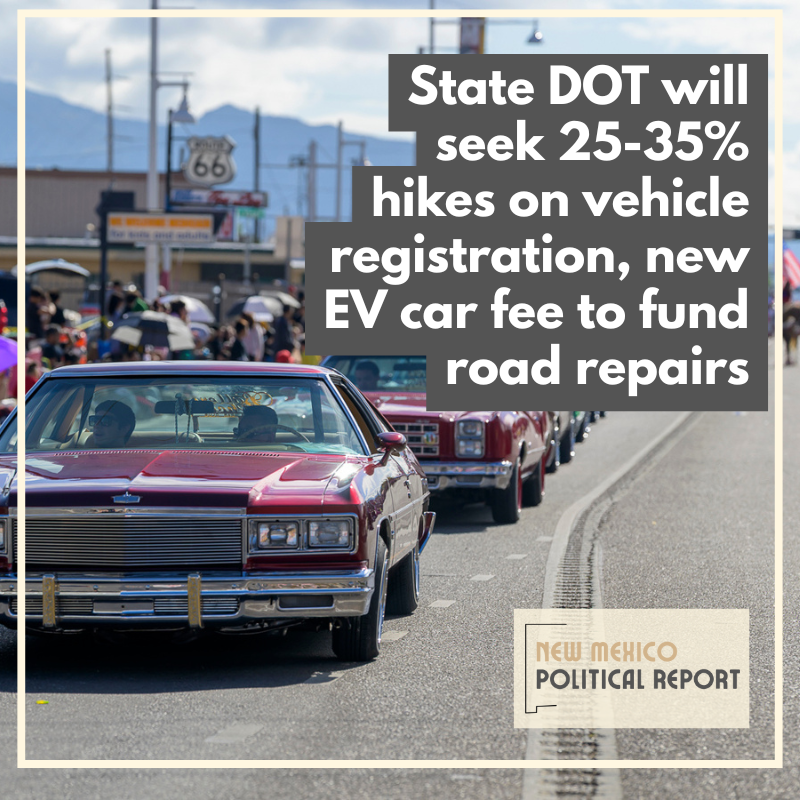Please be patient… We’re making a few tweaks to our website and user experience but our stories are still here.
New Mexico Political Report
Inside New Mexico Politics.
New Mexico motorists could pay more to keep their vehicles registered and on the road under a proposal from the state Transportation Department, part of a plan to boost its revenue amid rising construction costs and projected declines in annual revenue.
Ricky Serna, the New Mexico Transportation Secretary, told lawmakers on the Transportation Revenue and Infrastructure Subcommittee on Monday that the proposed increase, which failed to get legislative approval last year, and at least two other taxes, would bring an estimated $72 million into the Department annually
At the meeting, Serna said his Department is drafting a bill for the 30-day legislative session in January that will include a 25% hike in the fee, which is paid by New Mexicans to legally register a vehicle and operate it on public roads.
According to the New Mexico Motor Vehicle Department, the current fee to register a passenger vehicle ranges from $27 to $62, depending on its weight and age, and $54 to $124 for a two-year registration. For trucks under 26,000 pounds, the fee now ranges anywhere from $38 to $207 for a one-year registration and $76 to $414 for a two-year registration.
The bill will also contain a 35% hike in the Weight Distance Tax, which is paid by registrants and operators of commercial vehicles over 26,000 pounds and varies by weight, and will bring in $30 million more into the state. Serna added that his proposal will include an electric vehicle Surcharge to register an electric vehicle or hybrid vehicle in New Mexico.
“We’re working to fine-tune what that dollar amount would be,” Serna said to the committee about the Electric Vehicle surcharge.
The fee and tax changes in the proposal, which would also authorize $1.5 billion in bonding authority for the state’s Transportation Commission for state-owned roads, are identical to House Bill 145, which passed the New Mexico House of Representatives 65-0 during this year’s regular legislative session, but failed to make it to the Senate floor for a vote.
Money from the new taxes, Serna said, is needed as construction costs have soared by 25% since the COVID-19 pandemic, and are expected to balloon by 136% by 2050. At the same time, less money is projected to come into the State Road Fund, which depends on dollars from sources such as the state gasoline tax.
“The State Road Fund Revenues are expected to shrink about 50% in that same period of time,” he said. The projected erosion of revenues, he said, is due to increased fuel efficiency standards, which allow motorists to travel further while buying less gas and therefore means less collected from the gas tax, which has not been raised in decades.
Serna estimated during his presentation that a nearly 8% increase in fuel efficiency standards in six years would mean a $36 million hit to the Road Fund.
State Rep. Jenifer Jones (R-Deming) acknowledged during the meeting that New Mexico’s roads and infrastructure are in poor condition and more needs to be done to address that. However, given the state’s surpluses in revenue, Jones expressed wariness about any new taxes.
“I don’t even know that tax increases, especially for rural areas, are the answer,” she said.
Share this story and start a conversation
Alex Ross is a senior politics and legislative reporter for the New Mexico Political Report. He began his career in daily journalism in Montana and previously worked as a breaking news and politics reporter… More by Alex Ross











